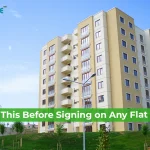
Top 20 Things to Check Before Buying a Flat or Old Home
July 22, 2025
Benefits of Installing Intrusion Alarm System Doors in 2025
July 22, 2025Soundproof windows for commercial spaces are one of the most important upgrades required in today’s professional landscape.
Loud streets, ongoing construction, and traffic chaos can give even the best commercial real estate a bad rep. If you’re a working professional, chances are you've dealt with constant sound disruptions. A simpler, cost-efficient way to reduce that noise is by investing in commercial window solutions designed to block sound.
In this blog we will understand why soundproof windows are necessary, how to choose the right ones and the latest innovations to help you make a clear decision.
Why Do You Need Soundproof Windows for Commercial Spaces
A workplace needs to be soundproof as ongoing noise disrupts focus, reduces productivity, and creates a poor experience for clients and employees alike. Soundproof windows for commercial spaces help by reducing noise infiltration by sealing out airborne sound waves and create a quieter indoor environment. In commercial settings, this is more than just comfort, it is a smart business decision.
Whether you run a law firm, therapy center, recording studio, hotel, or a shared office building, noise control affects how people work, focus, and interact. It also impacts lease value and client retention. A noisy space can become a deciding factor and drive away both tenants and customers, especially in competitive markets..
As additional benefits, some soundproof windows for commercial spaces also provide thermal insulation and added security. These features give dual benefits in form of energy savings and other possible monetary losses.
What Type of Sounds Can Soundproof Windows Block
Before you pick soundproof windows, know what kind of noise you're trying to block. Different sounds have different frequencies, and that affects which window works best.
Are you trying to block:
- Traffic and road noise
- Airplane sounds
- Construction machinery
- Human voices from crowded streets
Low-frequency sounds like engines need dense materials and wider air gaps. High-frequency sounds like talking or honking can be managed with multi-pane glass and tight seals.
A professional sound audit can help you figure out the exact type and level of noise you're facing. It also tells you what STC (Sound Transmission Class) rating your windows should have to get the desired results.
How to Choose Soundproof Windows for Commercial Spaces
1. Prioritize the Right STC Rating
A higher STC rating means better sound control. Standard residential windows fall between STC 25 and 30 which are inadequate for busy commercial buildings. Choose commercial window solutions with the right STC rating based on your building’s purpose and the surrounding noise levels.
Here’s a quick reference chart to guide your decision:
- STC 35–40: Moderate noise environments
- STC 45–50: High-traffic areas or spaces requiring quiet
- STC 50+: Ideal for fully soundproof commercial spaces
2. Choose Multi-Pane Over Single-Pane Glass
Single-pane windows don’t offer much help with noise control in commercial settings. A better option is double-pane or triple-pane glass with at least half an inch of space between the layers. That space plays a key role in reducing how much sound travels through.
Here’s what to consider:
- Double-glazing works well for general offices or storefronts with moderate noise
- Triple-pane glazing is ideal for buildings near highways, airports, or industrial zones
- Laminated glass includes a sound-absorbing interlayer that also enhances security
A wider air gap between panes improves sound insulation by reducing vibration transfer. For high-traffic zones or modern commercial builds, aluminium window glazing can be a solid option when paired with thermal breaks and acoustic seals.
3. Focus on Frame Construction and Sealing
The effectiveness of your windows depends on the glass, frame design and sealing too.
Opt for:
- Vinyl or fiberglass frames offer better acoustic insulation than aluminum.
- Foam-filled chambers suppress sound waves within the frame.
- Choose compression seals over brush seals to reduce vibration transmission.
- Proper caulking and installation ensure no gaps in framing that may allow some sound leaks.
4. Consider Secondary Glazing for Leased or Restricted Spaces
If you're working in a leased space or dealing with building restrictions, replacing windows is usually not an option. In such cases, secondary glazing is the quickest way to reduce noise without major construction. It adds an extra layer of glass or acrylic on the inside of your existing window, creating an air gap that helps block sound. This method improves your window's STC rating by 10 to 15 points. As it is a less invasive solution than full window replacement, it works especially well in heritage buildings or properties with strict regulations.
Innovations in Soundproof Windows for Commercial Spaces
If you're planning a new install or a future upgrade, it helps to know the latest innovations in commercial soundproofing. Here are a few emerging trends:
- Smart Acoustic Glass: Some commercial windows now come with switchable glazing that changes its sound absorption properties based on environmental noise levels. They are ideal for offices in fluctuating noise zones.
- Integrated Ventilation Systems: Advanced soundproof windows now offer filtered ventilation options that allow airflow without letting noise in and make them a very reliable option for wellness and air quality in less ventilated buildings.
- Dynamic Frame Designs: Customisable aluminium window glazing is being designed for larger, irregular commercial openings especially in buildings with modern architecture or unique façade constraints.
If you're investing in soundproof windows for commercial spaces these innovations won’t just solve today’s noise problem but prepare your space for future needs too.
Final Take
Choosing the right soundproof windows for commercial spaces is a strategic decision that affects everything from how your space sounds to how it performs. Whether you're planning a new build or upgrading an existing property, soundproofing is a necessity in commercial areas.
For more on uPVC doors and windows, visit GreenFortune and explore all the options you need to make your space quieter, stronger, and more efficient—whether it's for your office or your home.
FAQs
1. What are soundproof windows made of?
Most are built using double- or triple-pane glass with laminated layers and sealed frames that block and absorb sound. High-performance options may include gas fills and acoustic interlayers.
2. How much noise can commercial soundproof windows block?
Quality soundproof windows can block up to 90–95% of outside noise depending on their STC rating, installation quality, and the type of noise.
3. Are noise reduction doors necessary if I upgrade the windows?
Yes. Upgrading to noise reduction doors is just as important as installing soundproof windows. If your doors aren’t built to block sound, noise will still enter through the gaps. For full noise control in a commercial space, you need both soundproof windows and noise reduction doors working together.








